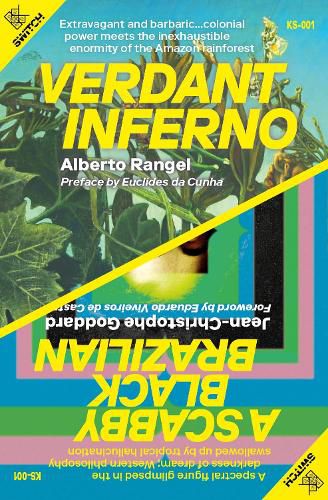Readings Newsletter
Become a Readings Member to make your shopping experience even easier.
Sign in or sign up for free!
You’re not far away from qualifying for FREE standard shipping within Australia
You’ve qualified for FREE standard shipping within Australia
The cart is loading…






A classic of Brazilian literature is twinned with an overheated tract in which tropical delirium swallows up Western philosophy, attacking the decolonial question with poetic ferocity.
A classic of Brazilian literature is twinned with an overheated tract in which tropical delirium swallows up Western philosophy. Both attack the decolonial question with poetic ferocity, ignited by the moment when colonialist rationality meets its limits in the magnificent disorder of the Amazon jungle.
Described in Eduardo Viveiros de Castro’s foreword as no longer an interpretation of Brazil but an interpenetration with Brazil, Jean-Christophe Goddard’s strange theory-fiction plunges Western philosophy into the great American schizophrenia, where its ordered categories are devored by uncontainable contaminations-first and foremost the rainforest itself, a monstrosity unapproachable by the cogito.
In 1664, the Portuguese Bento de Espinosa wrote of his terrifying hallucination of a scabby black Brazilian. But rather than a vision of the Other, the dream figure was a frightful glimpse of Bento’s own duplicity. Upon adopting the clean white nickname of Benedict de Spinoza, the philosopher cut ties with his homeland and its colonial misadventures, repudiating this specter that flees along the lines of migration- Spinoza is American … the journey is intensive. And in his wake, a cannibalized cast of conceptual personae are sucked into Goddard’s Pernambucan delirium- Franny Deleuze, Dina Levi-Strauss, Chaya Ohloclitorispector, Galli Mathias…
The rainforest also precipitates a deregulation of the senses in Verdant Inferno, Alberto Rangel’s classic 1904 work of Brazilian literature. In Rangel’s astonishing tales, this poet-engineer sent into the dark interior as a state representative records his encounters in a style that shimmers between objective documentary and visionary limit experience.
$9.00 standard shipping within Australia
FREE standard shipping within Australia for orders over $100.00
Express & International shipping calculated at checkout
A classic of Brazilian literature is twinned with an overheated tract in which tropical delirium swallows up Western philosophy, attacking the decolonial question with poetic ferocity.
A classic of Brazilian literature is twinned with an overheated tract in which tropical delirium swallows up Western philosophy. Both attack the decolonial question with poetic ferocity, ignited by the moment when colonialist rationality meets its limits in the magnificent disorder of the Amazon jungle.
Described in Eduardo Viveiros de Castro’s foreword as no longer an interpretation of Brazil but an interpenetration with Brazil, Jean-Christophe Goddard’s strange theory-fiction plunges Western philosophy into the great American schizophrenia, where its ordered categories are devored by uncontainable contaminations-first and foremost the rainforest itself, a monstrosity unapproachable by the cogito.
In 1664, the Portuguese Bento de Espinosa wrote of his terrifying hallucination of a scabby black Brazilian. But rather than a vision of the Other, the dream figure was a frightful glimpse of Bento’s own duplicity. Upon adopting the clean white nickname of Benedict de Spinoza, the philosopher cut ties with his homeland and its colonial misadventures, repudiating this specter that flees along the lines of migration- Spinoza is American … the journey is intensive. And in his wake, a cannibalized cast of conceptual personae are sucked into Goddard’s Pernambucan delirium- Franny Deleuze, Dina Levi-Strauss, Chaya Ohloclitorispector, Galli Mathias…
The rainforest also precipitates a deregulation of the senses in Verdant Inferno, Alberto Rangel’s classic 1904 work of Brazilian literature. In Rangel’s astonishing tales, this poet-engineer sent into the dark interior as a state representative records his encounters in a style that shimmers between objective documentary and visionary limit experience.